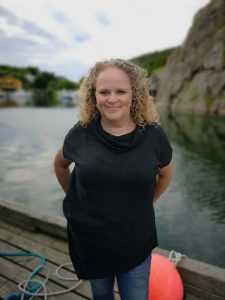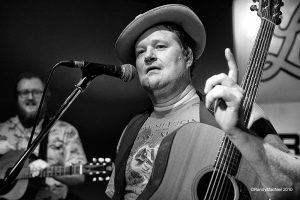As the COVID-19 pandemic upends the economy – mass layoffs, non-essential business closures, and schools shuttered indefinitely – the world has turned expectedly to artists for solace and hope. This, many artists are told, is the perfect time to write that massive hit, or unifying “We Are the World” song. But for many musicians, COVID-19 offers little inspiration; instead, it’s revealed how vulnerable their lives and livelihoods are.

Mark Marczyk
Balaklava Blues and Lemon Bucket Orkestra member Mark Marczyk, was watching Toronto gigs, European shows, conferences, and an extensive U.S. tour abruptly cancelled when he took action, quickly gathering artists and sponsors to create the ad hoc series URGNT in late March.
“A lot of times its been our [artists’] responsibility to respond creatively and emotionally in a way that expresses our humanity,” says Marczyk. “Not that everybody should be doing it, but our politicians, economists, and journalists have a specific role to fulfil, and I think our artists also have a role to fulfil. Let’s document this moment in history from our perspective. What is the beauty and tragedy of the crisis? And at the same time, have a practical response. Employment Insurance, and other, bigger support [plans] take months and applications, whereas we can get somebody to upload a video and put a hundred bucks into their bank account immediately.”
Since its first virtual show, URGNT has morphed, scaling back from Measha Brueggergosman’s Great Hall show to intimate home performances in order to adhere to the social distancing and gatherings rules. Marczyk says adapting, not giving up, is one of the greatest lessons they’re learning. But whether the series will grow beyond a crisis response depends on audiences.
“People donated online to the idea of doing shows in empty venues, that was compelling to people,” he says. “Now we’ve adapted our model. We might find that people are still really motivated by that, and want that experience. And if they don’t, then the reality is that we’re going to run out of money and not be able to do it anymore.”

Tamara Kater
For music manager Tamara Kater, watching how the fallout has affected her clients is disheartening. “The losses so far total more than $75,000 for the three months, and will be well over $100,000 if the summer festival season is also cancelled,” she says. “In comparison, my artists have recouped $2,400 in donations and online concert payments [as of late March].”
As she and her clients re-evaluate what comes next, she’s pondering if series like URGNT are a healthier alternative that will make touring less integral after the crisis passes.
“[Touring] is arguably the most demanding and caustic part of being a musician, not to mention how terrible it is for our environment,” she says, citing its gruelling emotional and physical effects. “The only silver lining of this terrible situation is if it provokes some honest dialogue about how unsustainable touring is, and what the industry can do to shift the balance to a more diverse revenue base for artists.”

Heather Bambrick
Singer and JAZZ.FM91 radio host Heather Bambrick says her losses include a Newfoundland and Labrador tour postponed, the East Coast Music Awards cancellation [she was nominated for 2019’s Fine State, and set to perform], as well as lucrative corporate gigs shut down. She’s invested in adjusting her home studio to potentially allow her to still do voice-over work and other gigs, but her worries go beyond the financial. “We’re concerned about missed opportunities, losing momentum on certain projects, and whether or not an already struggling industry is going to be able to recover from this,” she says.
For now, she’s taking comfort that her return to radio is bringing audiences all over the world together. “Financially, it doesn’t add up to much, but it’s something, and I feel very blessed to be able to bring music, and hopefully some sense of normalcy, to listeners’ lives right now,” says Bambrick.
But while she embraces new means to reach audiences, the road still calls. “The new virtual performances are great ways for artists to give audiences ‘tastes’ of their performances prior to shows,” she says. “From a marketing or promotional perspective, I think this is definitely a thing we can use to our advantage. I also hope that audiences will miss seeing live music. For me, there really is nothing like being in the same room and experiencing the ‘vibe’ of a performance in person.”

Allison Russell, of Birds of Chicago
Allison Russell of the duo Birds of Chicago is also missing the road. “Trust me, when this is all over, I’ll be savouring every highway mile and red-eye flight,” she says wistfully. “We’ve lost all of our shows into June; and we’re bracing to lose the entire summer – over half our yearly income.” Because of this, Russell views technology as a saving grace. “We’re going to do our best to make our content more readily available for our community, via all the 21st Century modes we’re blessed with: Patreon, live-streaming concerts. As bad as this feels, when I think about how this would impact artists even 15 years ago, we’re in a better position to deal with this now.”
JUNO nominee Corin Raymond (managed by Kater) is drawing on the lessons of the road to bolster him. “Musicians live like actors: there’s always troughs and valleys between tours, between paydays,” he says. “So, having the point of view of a travelling musician might even be an advantage at a time like this.”

Corin Raymond
After Raymond returned to Toronto, following the JUNO Awards’ abrupt cancellation, and 40 shows halted, he noticed that even though gigs were cancelled, his fans were reaching out.
“I feel woefully inadequate when attempting to describe the support and love of my fans and what it means to me,” says Raymond. “I’m being crowd-surfed on their hands. Friends and fans have been sending me donations and beautiful messages – and real mail! – this past week, letting me know that my work is not forgotten. My life and livelihood are based on an economy of generosity, which inspires itself; love is like that. My job is to give people everything I have to give, sometimes a little more than that – and in return, my fans and friends pay me with money that feels like it’s been kept in their hearts to be spent only on something special. It’s a deeply rewarding way to get paid, because the money I make is an actual manifestation of real love, which doesn’t stop just because I’m off the road.”
Silver Linings?
Good can come out of this, and it involves music lovers, fans, and corporations.
“Encourage people to purchase CDs directly from artists so that the money they’re paying goes straight back to the artists, rather than to a third-party provider who’ll take a cut of the sale. On Friday, March 27, BandCamp announced they would not take a commission that day, allowing artists to retain all sales income. There were some 800,000 items sold, resulting in artists being paid $4.3 million. We need more of that, right now!” – Heather Bambrick
“Even a modest uptick in the numbers of people buying merch, and actually purchasing albums [and] singles, in addition to streaming, would make a huge difference in artists’ bottom line.” – Allison Russell, of Birds of Chicago
“This crisis only shines a stronger light on corporations [YouTube, Spotify, Apple] to be as creative in finding solutions for better compensation to creators as they were in disrupting the music business model in the first place.” – Tamara Kater [who cites the Spotify COVID-19 Music Relief Project as a good first step].
“I was crowdfunding last year to finish my latest album and accompanying book (Dirty Mansions, 2019). It really hit home just how ready my fans are to support me. So, my ‘Plan B’ will definitely involve launching something in the Patreon style, an arrangement to allow my fans and I to connect and inspire each other in an ongoing way.” – Corin Raymond